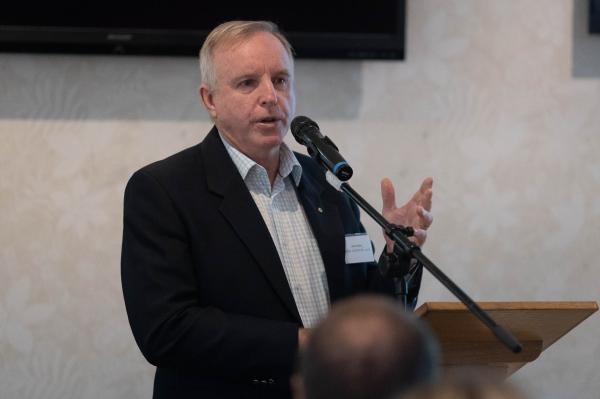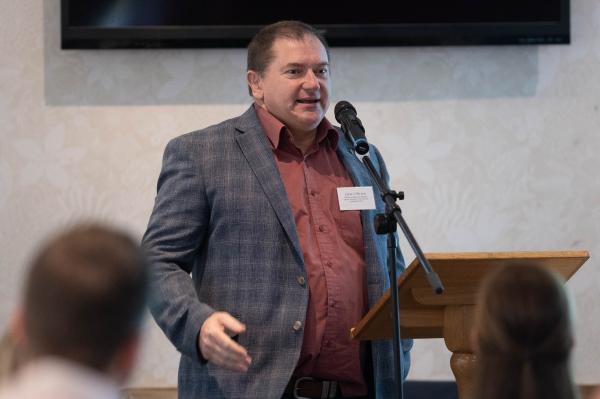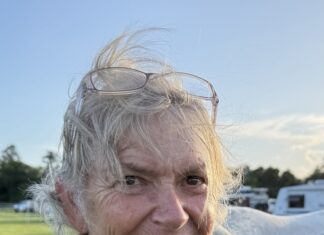Powerful, emotion-charged stories of horrors experienced in their working lives, the nightmares and emotional breakdowns that followed and their journey to recovery silenced the crowd at a veterans forum at Tewantin last Saturday.
Wide Bay MP Llew O’Brien and Major General John Cantwell kicked off the Healthy Mind – Healthy Body Wellbeing Forum hosted at Tewantin-Noosa RSL with the honest sharing of their PTSD experiences.
“Mental health has been a big part of my professional life,” Mr O’Brien said. But his experience was not the type of mental health issue some politicians come up with to explain bad behaviour, that he detests.
Mr O’Brien said he grew up in a “normal life”. When his mother developed motor neurone disease he left school at grade 10 to become her carer. His mother passed away in 1989 shortly before he met his “beautiful wife”.
Mr O’Brien thought serving the community would be his ambition and wanting to be a good role model for his kids at 27-years-of-age he decided being a police officer would be a good fit.
In 2001 he wanted to bring down the road toll. It was a personal mission after having lost loved ones in car accidents. After completing a course he was assigned to a stretch of Bruce Highway between Gympie and Cooroy, the most dangerous stretch of the Bruce Highway at the time.
“I was the officer who got called out in the middle of the night when two cars came together and someone was dead,” he said. “I had to tell the families, go to the autopsy, to court. The accidents were getting more and more. I was getting numb to it – that was my way of coping. One day I went to a double fatal, going at high speed, lights flashing, heading down the highway at 160km/hr. I wasn’t feeling anything at all. Shortly after that the nightmares started.”
One day as he stopped at traffic lights he looked at the tail lights of the car in front. They were identical to those at a fatal accident he had recently attended and he just froze. “I had a complete panic attack,” he said. He started imaging the people in the accidents he attended were his own kids.
“One morning I couldn’t get out of bed,” he said. “I put my hand up and started a new life. I left work. I wasn’t going back. I was never going to be a policeman again.”
Mr O’Brien started getting fit, riding his bike. He went to see a psychiatrist.
“There were times I had to go to hospital – a mental health clinic. I thought I’d really hit a new low, that I should be ashamed. But that’s as bad as a diabetic going to a clinic. You need help.”
After a couple of years he returned to work as a policeman.
“It was one of the biggest battles of my life,” he said. “Now I know my limits. I know how to manage myself mentally.
“My recovery was my greatest personal achievement.”
Mr O’Brien recounted his actions in opposing his political party in its aim to vote against a Royal Commission into Veteran’s Suicide.
“Voting against your party is like a cardinal sin,” he said. “I told the Prime Minister’s office I’d be crossing the floor. I was strongly criticised. I was told if I took that step it wouldn’t be good for me.
“I tell you what’s not good,“ he replied. “It’s when someone takes their own life. Try to tell the family“.
One hour after he’d spoken up the government changed tack, announcing the establishment of a Royal Commission.
“The government is spending a lot of money but what you’re doing as individuals is what motivates me,” he told guests.
Major General John Cantwell said his experience echoed those of Llew O’Briens and after he started speaking publicly about PTSD he had met as many policemen, ambulance officers and firefighters as veterans with the condition.
Cantwell began his army career in 1974 as a private. After spending time in the ranks he studied to become an officer. Attaining the rank of Major at the age of 35 year he was attached to the British Army based in Germany in 1990 when Sudan Hussein invaded Kuwait. A coalition of 30-odd countries wasn’t going to let that happen so their forces got together to kick the Iraqis out of Kuwait, he said.
“It was exciting to go to war,” he said. “I was very well trained and I wanted to try those skills out. I wanted to show I could operate in combat.”
Cantwell said in the first Gulf war the coalition massively overmatched the Iraqis.
“We absolutely destroyed them in an intense air campaign – 60,000 Iraqis were killed, hundreds of thousands injured. I had no idea there was any such thing as PTSD.
“I had some extraordinary experiences. (The Allies) used bulldozer blades attached to tanks to bury the Iraqis alive – hundreds and hundreds of people. In the aftermath I could see some that had tried to escape their fate. You could see a hand coming out of the sand. Something in my head said you’re going to remember that hand. A lot of other things went on. I found myself in precarious positions. I had some close calls. I was obliged to walk through a minefield, deal with numbers of Iraqis dead, mostly burnt, ghastly scenes.”
When he returned to Australia he’d become something of a novelty with Australians having had little combat exposure since Vietnam.
While some people said “well done” others made derogatory remarks. “They decided we were just a bunch of killers,” he said.
“The nightmares began – I was being buried, the hand, the bodies, the mass graves. I was freaking out. I had no idea what was going on. No one had told me about emotional troubles. In the back of my mind I remembered something about battle fatigue, shell shock. I judged myself a weak loser. I thought I was losing my mind.”
Cantwell said colleagues began to see he wasn’t on his best game and convinced him to see a medical officer. Less than helpful the army-appointed psychiatrist he saw told him to “harden up and think happy thoughts”.
“I was disgusted by this and said to my wife, Jane, no-one will ever hear this again.”
For the next few years he “soldiered on”, presented a happy demeanour and rose through the ranks.
In his second Iraqi deployment as a Brigadier he witnessed a lot of violent and horrific death during combat between Iraqis Sunnis, Shia, Al Qaeda, insurgents, criminal gangs. “It was inhuman. It did a lot to destroy my belief in human nature,“ he said. “I came home – same story.”
On his return he saw a psychiatrist not attached to the army he said “helped a little”, but he wanted to advance his army career, so kept his mental health issues hidden.
In 2010-11 he was deployed to Afghanistan in charge of the Middle East operation.
“In three months that year 10 soldiers were killed and 64 wounded – many explosive amputations, multiple limbs lost. It was pretty awful,” he said.
“I came home in 2011 and I was done like a dinner. I was on the short list for Chief of Army. I rang (Air Chief Marshall) Angus (Houston) and said I’m sick. He said what can I do to help. That was the start of a journey of recovery. I had the chance to get good quality assistance – that was life changing. I don’t know if I’d be here without that. I recognised finally I couldn’t do that on my own. I spent time in a residential facility – that brought it home to me I was really messed up.”
When Cantwell eventually opened up about his issues some people were angry he hadn’t asked for help, others openly derided him, including politicians who used parliamentary privilege to call him “an alarmist and a sook”.
After retiring from the army in 2012 he travelled widely speaking to assist others with PTSD.
“The message I was carrying was it’s normal to have abnormal events affect us. If you’ve seen terrible injury, death, your mind is going to react in normal ways, processing them, working on you when you’re asleep, driving the car.”
Cantwell said medication often helped but he knew a lot of officers who shied away from medication because taking it would exclude them from using a gun or operating equipment. He asked the audience if that was more important than your family and kids – the people who love you.
His parting advice, just as Llew O’Brien’s, was to seek help.
“If you are struggling just think about the people who love you,” he said. “They want you to be your best. You’ll probably never be the same again but there’s no reason to let that dominate your life. Get medication. Don’t get on the grog, stay away from the dope. Just live your life.”










